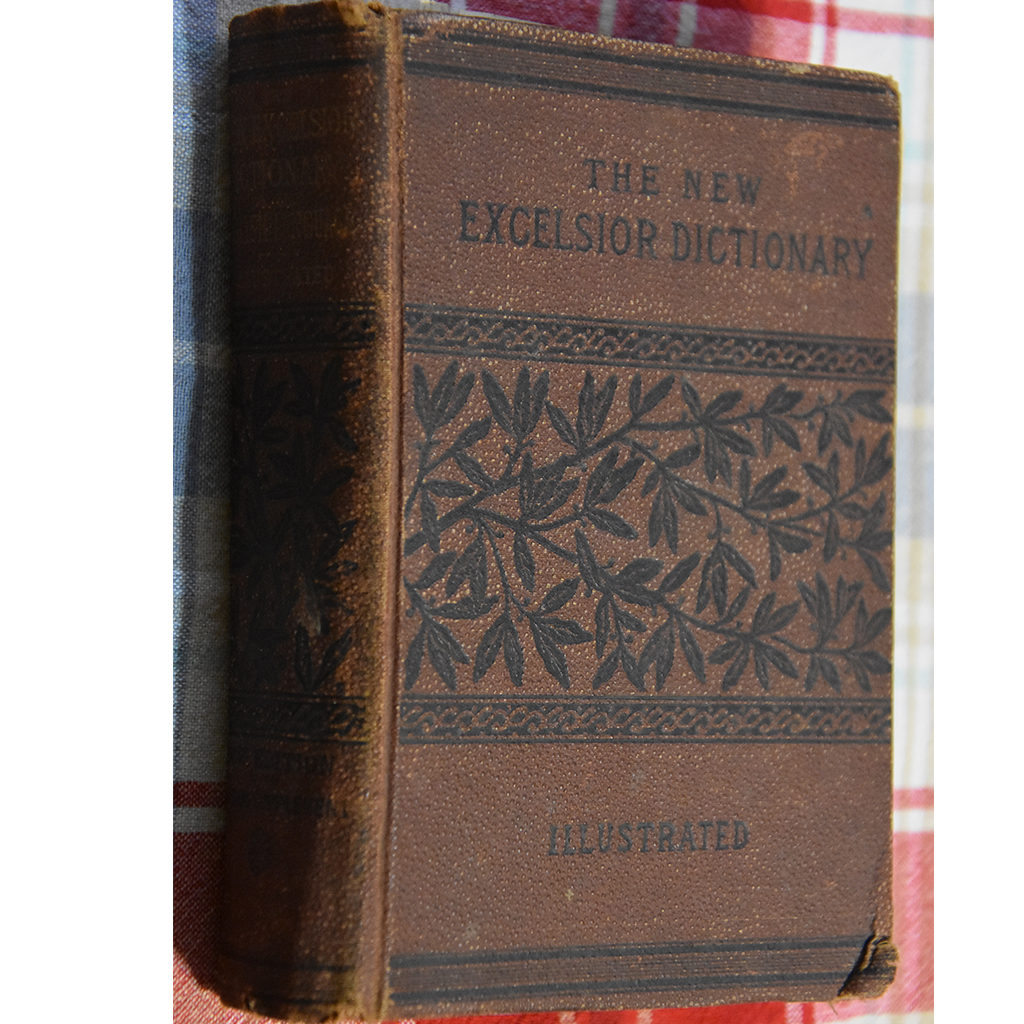Blog
My Introduction to
Victorian Era Slang
If you ever get invited to help a friend empty a storage unit, take my advice and jump at the chance. Most of the time, I find that service is its own reward with those warm, fuzzy feelings that just won’t go away. However, on this occasion, it was much more. I was given a precious gift found amongst the odds and ends left behind. My friend, Margie, gave me an antique book from 1891, The New Excelsior Dictionary. Its leather cover is cracked and falling apart, and its pages are rotting and easily come loose when opened, but I love it for all that. On its title page, there is a scripture quoted: “A word fitly spoken is like apples of gold in baskets of silver. PROV. XXV. 11, New Version.” How true that is!
At the back of this little brown dictionary is a section entitled, “Slang Words and Phrases with Their Meanings,” which is a gold mine of Victorian era slang. This began my treasure hunt of Victorian slang. I found that there are a few resources available online, one of which was a book titled, Passing English of the Victorian Era: A Dictionary of Heterodox English, Slang, and Phrase by J. Redding Ware, published in 1909 (https://publicdomainreview.org/collection/a-dictionary-of-victorian-slang-1909), which had many unique turns of phrase. Merriam-Webster Dictionary is also a great source, especially the online version (https://www.merriam-webster.com/), since it gives the year of origin for many of the slang words. By using this resource, a writer of historical fiction is able to know whether or not the slang terms are anachronistic.
I have had so much fun reading these books, and I’ve even found a few golden zingers for use in my Gilded Age Romance series. Some of them I’d heard before, but others are truly unique. In fact, I think we ought to get them back into today’s vernacular!
Here are a few slang terms and their meanings gleaned from my searches and an example of how I used them to make my stories come to life:
- a brick shy of a load – used when calling a person’s mental abilities into question
“Security?” Mrs. Grenhall spat. “You’d end up living with those folks of yours.” She sneered up at him. “Why, your farm’s not much bigger than a postage stamp. And I suspect your mother is a brick shy of a load. That is a situation I could never condone.”
Heat crept into Sheridan’s face. He’d often feared that his mother’s grasp on reality was slipping, but she was loving and harmless. What right did this hellcat have to judge his family when everyone knew for certain she was insane?
~ excerpt taken from Pearls & Steel
- breath strong enough to carry coal – used when describing a drunk person’s breath
- shipwrecked – drunk
- tetchy – touchy or irritable
“You know,” Bonnie said, “every bride wants a romantic honeymoon. I know I did—even if I was older when I married. But when he came to bed on our wedding night, his breath was so strong it could have carried coal. Whiskey was his love, and that is what he smelled like for most of our marriage. He was shipwrecked half the time.” Bonnie slammed the crock of butter onto the counter and wiped her sleeve over her forehead. “I’m sorry I’m so tetchy right now. I just need time to blow off some steam.”
~ excerpt taken from Ninety-Nine White Horses
- Daylights – a person’s eyes
He shook George several times, slamming the back of his head against the beam.
“I’m warning you here and now—if you ever come near Molly again, I’ll darken your daylights for good. Never come near her again. You hear me?”
~excerpt taken from Ninety-Nine White Horses
I hope you enjoyed this short walk down memory lane, which might be a road less traveled for some. Check back for more posts of fun slang terms and other hints on how to use true events and real places to enhance your historical fiction—or fiction of any kind, for that matter.
Until next time,
J.B. Wadsworth


